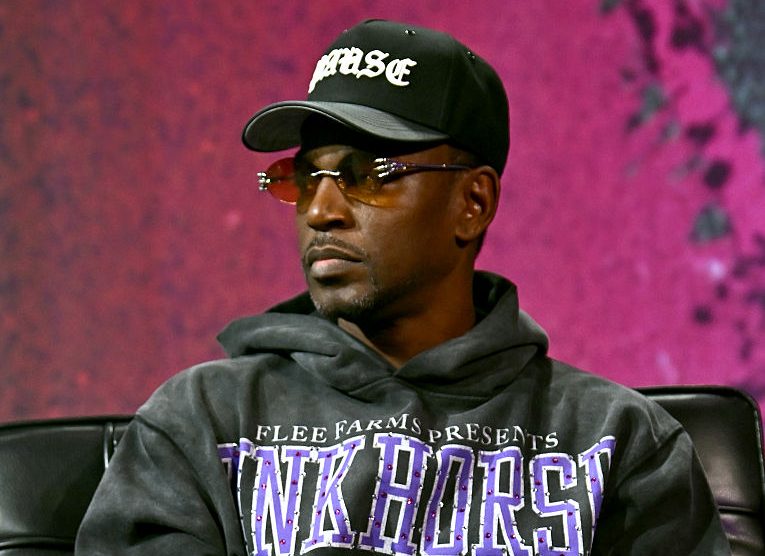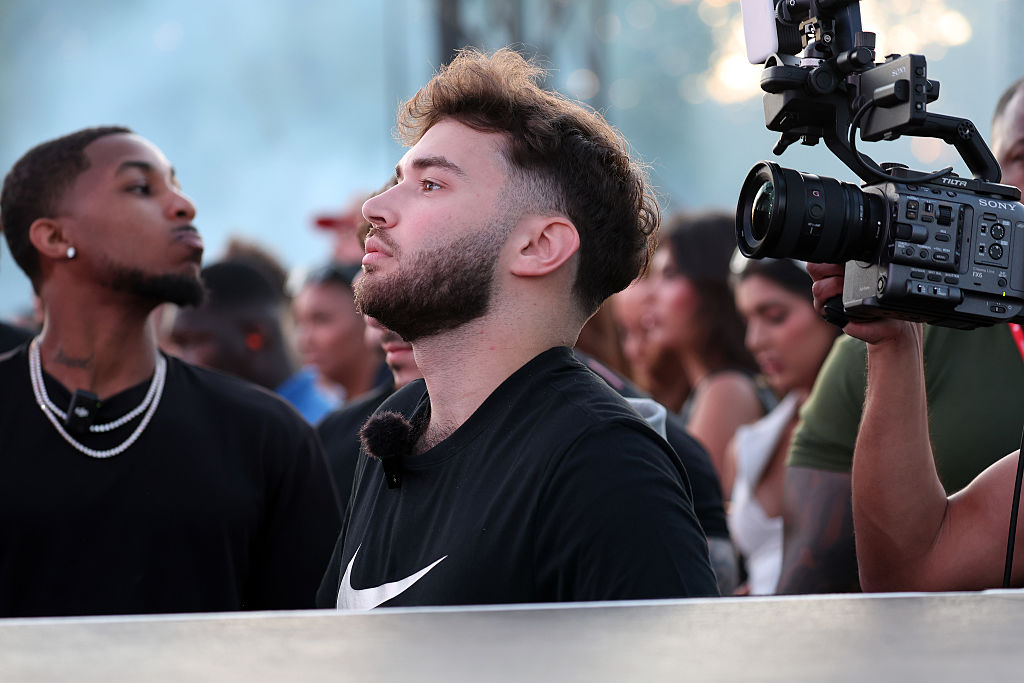Lawsuit
Page: 5

Trending on Billboard
Former Hot Boys member Turk is being sued by a concert promoter over online threats that supposedly threatened to derail a Cash Money Records reunion tour this summer.
The $12 million breach of contract and defamation lawsuit, filed in New York federal court on Wednesday (Oct. 29), is the latest in a bitter legal salvo between Turk (Tab Virgil Jr.) and promoter Dope Shows over the Cash Money Millionaires 30th Anniversary Tour. Named in honor of a Cash Money Records supergroup from the ’90s, the ongoing reunion tour features Cash Money figures like Birdman, Juvenile and former Hot Boy B.G.
Related
Turk originally signed onto the tour as well, but was kicked off the roster before his first performance this summer. The rapper subsequently sued Dope Shows for $340,000 in Florida last month, alleging he was removed from the tour because the promoter wasn’t selling enough tickets and ran out of money to pay him.
Now, Dope Shows is countering in its own lawsuit that money had nothing to do with Turk’s removal. Rather, the promoter says it had to boot Turk because he had been physically threatening B.G. on social media — leading venues to voice concerns about potential violence and risking disruptive intervention from B.G.’s probation officer.
Dope Shows alleges that in response, Turk began posting defamatory content on Instagram, spreading his false narrative that the promoter was struggling financially. Dope Shows claims Turk’s Florida case is a “sham lawsuit” that merely serves to amplify those falsehoods.
Related
“Desperate to revive his flagging rap career, Turk is attempting to sabotage the tour through childish and petulant antics that he hopes will regain the public’s attention,” writes Dope Shows’ lawyer, Jeffrey Movit. “Turk’s publicity stunts are an abject failure, as they have done nothing to advance his career. Rather, through his malicious and misguided actions, Turk has created nothing more than massive legal liability for himself in this lawsuit”.
Dope Shows alleges that Turk owes $5 million for breach of contract and $7 million for defamation. According to the lawsuit, Turk’s conduct has deterred fans from attending the reunion tour and led other artists to doubt the promoter’s abilities.
Turk’s attorney, Paul Aloise, denied all of Dope Shows’ claims in a statement to Billboard on Friday (Oct. 31). Aloise says the new lawsuit is a “desperate attempt” by the promoter to “try and shift the blame away from their own unethical business practices and promotional failures.”
“While the complaint defames my client and says that he was attempting to sabotage the tour to try and revive his flagging rap career, the complaint conveniently leaves out the fact that on August 3, 2025, Turk, released his own album, JOSEPH, on iTunes, which peaked at #5 on the iTunes Hip-Hop Chart,” added Aloise. “Thus, my client has no intentions of trying to sabotage a tour he wants to be on, let alone to help his rap career.”
Trending on Billboard
A judge has rejected Tory Lanez’s latest attempt to avoid sitting for a deposition in litigation stemming from his alleged shooting of Megan Thee Stallion in 2020.
Lanez (Daystar Peterson), who’s serving a 10-year prison sentence for allegedly shooting Megan in the foot during a drunken argument, is a begrudging witness in her civil defamation lawsuit against gossip blogger Milagro Gramz. The Houston rapper (Megan Pete) claims Lanez is paying Gramz (Milagro Cooper) to spread falsehoods about the incident and the 2022 trial.
Related
Lanez’s lawyers claim deposition testimony could hurt the Canadian rapper’s ongoing appeal of his criminal shooting conviction. But Judge Lisette M. Reid says in a Thursday (Oct. 30) order that it’s “unclear” how that’s possible.
“The focus of Mr. Peterson’s deposition is his relationship with defendant Cooper, not with plaintiff,” writes the judge. “Thus, the court does not see how testimony regarding Mr. Peterson’s communications and relationship with defendant would serve to prejudice his criminal appeal.”
Judge Reid says Lanez must be deposed, and he can assert his Fifth Amendment right against self-incrimination “on a question-by-question basis, the propriety of which will be decided by the undersigned who will be supervising the deposition.”
Reps for Megan and Lanez did not return requests for comment on Friday (Oct. 31).
Related
Megan’s attorneys have been attempting to depose Lanez for months. Lanez’s first deposition was held at the jail in April, but he was so uncooperative that the questioning had to be stopped after just 44 minutes.
Lanez was held in contempt for this behavior and ordered to sit for a second deposition, this time under a judge’s supervision. He showed up to the courthouse on Sept. 15 with a new lawyer, Crystal Morgan, who this time asserted that Lanez wouldn’t answer any questions at all due to concerns about the appeal.
A third attempt at Lanez’s deposition will be held “at a date agreed upon by all parties,” wrote Judge Reid, who says she may order Lanez to repay Megan’s lawyers for the time they’ve expended on the back and forth.
The deposition battle comes as a Nov. 17 trial date is fast approaching in Megan’s lawsuit against Gramz. The rapper says Gramz has been posting lies about Lanez’s shooting trial, including false information that the gun in question went “missing,” to undermine the guilty verdict and ruin her reputation. Gramz denies any wrongdoing and says all of her social media activity is First Amendment-protected free speech.
Lanez hasn’t been the only difficult witness in the case. Two of his close allies — legal advocate Ceasar McDowell and blogger DJ Akademiks — have also been accused of derailing their depositions with disruptive behavior.
Trending on Billboard
Udio now says it will briefly allow subscribers to download their existing songs following widespread backlash to drastic changes made to the platform following the AI firm’s licensing settlement with Universal Music Group (UMG).
The move comes in response to growing outrage — and even threats of legal action — from users after Udio struck the UMG deal, under which the AI company immediately barred its paying subscribers from downloading their own songs, even those they had created long before the UMG deal.
Related
In the statement posted late Thursday (Oct. 30) to Reddit, Udio said it would provide a 48-hour window starting Monday (Nov. 3) for all users to download their existing songs. Any songs downloaded during that time will be covered by the prior terms of service that existed before the UMG settlement.
“Not going to mince words: we hate the fact we cannot offer downloads right now,” Udio CEO Andrew Sanchez wrote in that post. “We know the pain it causes to you, and we are sorry that we have had to do so.”
In the Reddit post, Sanchez also tried to explain the reasons for the original change, saying that Udio is a “small company operating in an incredibly complex and evolving space” that had chosen to partner directly with artists and songwriters. “In order to facilitate that partnership, we had to disable downloads,” he said.
Related
If the download ban is a requirement of the legal settlement with UMG, how can Udio now reverse course and allow users to download their songs? Sanchez said Udio had “worked with our partners to help make this possible.” A spokesman for UMG did not return a request for comment.
Any existing songs that are downloaded during next week’s window will be owned by the users who made them. Under Udio’s terms of service, the company grants all users of the platform — paid subscribers or free users — any ownership rights to their songs, including express permission to use them for commercial purposes. The company does require users of the company’s free tier to include attribution that the song was made with Udio.
The deal between UMG and Udio, announced Wednesday (Oct. 29), will end UMG’s allegations that Udio broke the law by training its AI models on vast troves of copyrighted songs. Under the agreement, Udio will pay a “compensatory” settlement, and the two will partner on a new subscription AI service that pays fees to UMG and its artists, and allows artists to opt in to different aspects of the new service.
Related
The revamped Udio will be quite a bit different from the current service — a “walled garden” where fans can stream their creations but cannot take them elsewhere. While the new version won’t launch until next year, the firm immediately disabled all downloading on Wednesday, a move that drew predictable backlash from its users, particularly on the company’s Reddit sub.
“This feels like an absolute betrayal,” wrote one Reddit user. “I’ve spent hundreds of $$$ and countless hours building tracks with this tool,” wrote another. “No one warned us that one day, we wouldn’t even be able to access our own music. You can’t just pull the plug and call that a ‘transition.’”
Some Udio subscribers even floated the idea of legal action: “What you have committed is fraud. Just so you understand,” wrote one user. “You may not feel any legal ramifications immediately, but not everyone who used your platform is without resources.”
The window for downloads will kick off on Monday, but it’s unclear exactly when. Udio said in the post that it would “provide the exact starting time and end time” on Friday (Oct. 31), but had yet to do so by Friday afternoon. An Udio spokesperson did not offer more details when reached by Billboard for comment.
Drake is continuing his legal battle with UMG after the lawsuit he brought against the record label over Kendrick Lamar’s “Not Like Us” was dismissed earlier in the month. Filing an appeal this week, Drake aims to get the judge to reinstate the lawsuit, which alleges UMG aided his rival in relaying what his side felt with defamatory claims out to the public, thus damaging his brand.
Music Business Worldwide reports that Drake filed a Notice of Appeal on Wednesday (October 29) in a countering stance against Judge Jeannette Vargas’ October 9 dismissal of the lawsuit. The Canadian superstar alleges that UMG intentionally promoted Lamar’s blistering “Not Like Us” diss track, writing in the complaint that the label pushed the song’s popularity “while knowing that the song’s insinuations that he has sexual relations with minors were false and defamatory.”
Judge Vargas ruled that Lamar’s lyrics, despite the OVO honcho’s insinuation that they were meant to defame him, were essentially stated opinions that were protected instead of facts. Further, the judge said that the case should be examined in full as both gentlemen verbally sparred across with several lines and songs between them.
The filing for appeal is the start of the process, with a full appellate brief filing happening at a later date. There are no new developments as the notice was just filed a day ago, and it will take months for things to move ahead.
—
Photo: Getty
Cam’Ron showed up for J. Cole’s “Ready ’24” track from the North Carolina rapper and producer’s MIght Delete Later project, and is now taking legal action against his past collaborator. Cam’Ron claims J. Cole reneged on plans to collaborate on other tracks or have the Dreamville honcho on the Harlem rapper’s popular podcast program.
TMZ reports that court papers say the artist born Cameron Giles filed a lawsuit alleging that Cole, real name Jermaine Cole, neglected to make good on plans to work on further music with Killa Cam or appear on the It Is What It Is podcast with Mason “Ma$e” Betha and Treasure “Stat Baby” Wilson.
Killa says he recorded the verse in 2022, and between July 2023 and April 2024, he kept in contact with Cole, who kept rebuffing the invitation for further work for reasons not shared in the report.
Cam’Ron is seeking a co-author credit for “Ready ’24” and to be compensated for his time, which totals over $500,000 as of the report.
—
Photo: Getty
Trending on Billboard
It ain’t over yet: Drake has formally launched his appeal of a court ruling that dismissed his defamation lawsuit against Universal Music Group (UMG) over Kendrick Lamar’s diss track “Not Like Us.”
The move on Wednesday is the first step aimed at reversing that ruling, in which a federal judge ruled earlier this month that Drake could not sue over Kendrick’s lyrics that called him a “certified pedophile.” The star’s lawyers, who say millions of fans took that claim literally, had already vowed to appeal the decision.
Related
It could take well over a year for the appeals court to rule on Drake’s case, prolonging a messy legal drama that has captivated the music industry and, at times, drawn ridicule in the hip-hop world. If the appeals court sides with Drake, it could mean years more litigation after that.
In his new court filing, Drake formally stated his intention to appeal, but did not include any detailed arguments on how he will do so. Such arguments are made in later briefs at the appeals court, where lawyers for both sides will eventually make their case.
A rep for Drake told Billboard on Wednesday: “This confirms our intent to appeal, and we look forward to the Court of Appeals reviewing that filing in the coming weeks.” A spokesman for UMG did not immediately return a request for comment.
Lamar released “Not Like Us” in May 2024 amid a war of words with Drake that saw the two UMG stars release a series of bruising diss tracks. The song, a knockout punch that blasted Drake as a “certified pedophile” over an infectious beat, became a chart-topping hit in its own right and won five Grammy Awards, including record and song of the year.
In January, Drake took UMG to court over the song, claiming his own label had defamed him by boosting its popularity. The lawsuit, which didn’t name Lamar himself as a defendant, alleged that UMG “waged a campaign” against its own artist to spread a “malicious narrative” about pedophilia that it knew to be false.
Related
Those claims stunned the music industry. Few expected a rapper to respond to a diss track with a lawsuit — a move that drew hackles in the hip-hop world and condemnation from legal scholars. Fewer still expected him to file it against UMG, his longtime record label and the biggest music company in the world.
Just 10 months after Drake filed it, Judge Jeannette Vargas dismissed the case. She said Kendrick’s insulting lyrics were the kind of “hyperbole” that cannot be defamatory because listeners would not think they were statements of fact. She said fans didn’t expect to hear “accurate factual reporting” from a a diss track “replete with profanity, trash-talking, threats of violence, and figurative and hyperbolic language.”
“The artists’ seven-track rap battle was a ‘war of words’ that was the subject of substantial media scrutiny and online discourse,” the judge wrote. “Although the accusation that plaintiff is a pedophile is certainly a serious one, the broader context of a heated rap battle, with incendiary language and offensive accusations hurled by both participants, would not incline the reasonable listener to believe that ‘Not Like Us’ imparts verifiable facts about plaintiff.”
Source: Simone Joyner / Getty
It’s no secret that Drake and Adin Ross are down bad these days due to their own personal life decisions as of late, respectfully. But now it seems like things may get a bit worse, as both men are facing some pretty serious accusations in a new lawsuit.
According to Complex, a Missouri man, Justin Killham, has just filed a lawsuit against the Canadian crooner and popular streamer alleging that the two have been promoting Stake’s parent company Sweepstakes Limited’s online gambling. The suit says it’s illegal and goes against Missouri’s state gaming and consumer protection laws. Stating that Stake has engaged in “deceptive trade practices” by using said celebrities in promoting their gambling website, Killham feels that they’ve exploited “vulnerable” Missourians who’ve fallen prey to their marketing and promotion methods and developed gambling addictions as a result.
Per Complex:
“Stake in particular pays online influencer-defendants Adin Ross and Aubrey Drake Graham each millions of dollars yearly to engage in promotion ‘livestream online casino gambling with Stake.com,” the lawsuit reads, accusing Ross and Drake of claiming they gamble with their own money and don’t disclose they’re using Stake-provided funds.
Love News? Get more! Join the Hip-Hop Wired Newsletter
We care about your data. See our privacy policy.
“These acts are deceptive, fraudulent and unfair and violate Missouri law,” the suit adds. “Drake and Ross deceptively and fraudulently misrepresent, as does Stake itself, that Stake is a social casino and not a real one in their promotional role for Stake, and they also fraudulently and deceptively misrepresent that they only gamble with their own money on Stake.”
Killham is seeking “recovery of gambling losses” on behalf of himself and others impacted by Stake, Drake, and Ross.
While many people wouldn’t fall for anything that Drake or Adin Ross would promote these days, Killham himself seems to have taken the bait and now wants restitution for his own poor life choice (no shots). Still, it seems like he has a pretty strong case, as he seeks to have someone held accountable for the losses he might’ve suffered at the hands of Stake.
More from Complex:
“To hide the true nature of its online gambling operation, Stake asserts that the only chips it sells to consumers are tokens called ‘Gold Coins,’ which can only be used for ‘casual’ gameplay on the Stake.us platform, have no real-world value, and can never be cashed out,” the lawsuit reads. “However, Stake bundles every purchase of Gold Coins with a second type of token called ‘Stake Cash’ as a supposedly free bonus. Unlike Gold Coins, Stake Cash can be wagered on casino games and cashed out for real money at a fixed 1:1 ratio to the U.S. Dollar – exposing Stake Cash as a clear vehicle for real-money gambling.”
The lawsuit argues that Stake Cash, which can be wagered on games over the internet and redeemed for real money, allows the company to get away with “operating an unlicensed and illegal online casino in Missouri.”
Naturally, a spokesperson for Stake has denied the allegations saying, “We reject allegations that have been made in the media in relation to this potential claim and will vigorously defend this and all such claims,” and says they have yet to be served any official complaint thus far.
Should be interesting to see how this one shakes out.
What do y’all think about this lawsuit against Drake and Adin Ross? Let us know in the comments section below.
Trending on Billboard
THE BIG STORY: Taylor Swift’s Eras Tour was so big that it has developed its own legal system.
With a record-shattering haul of more than $2 billion face-value ticket sales — and many times that in the secondary market — it’s not surprising that legal disputes have broken out. Don’t forget the old adage in the music industry: “If you write a hit, you get a writ.”
It started immediately after the chaotic pre-sale, when Swift fans filed class actions against Ticketmaster, accusing the company of causing the “disaster” rollout. In August, the Federal Trade Commission sued a ticket broker for allegedly using bots to buy thousands of Eras tickets that it resold for more than $1 million in profit. Just this month, an angry Swiftie sued StubHub for giving her “inferior” seats after she dropped $14,000 on Eras tickets.
Related
The latest fallout came last week in a criminal case — over a “cybercrime crew” that allegedly stole Eras tickets from StubHub and resold them for a windfall. For more, go read our full story here.
Other top stories this week…
BAND V. LABEL – Powerhouse regional Mexican label Rancho Humilde is locked in a bitter legal dispute with one of its fastest rising acts, the California-based band Fuerza Regida, with allegations of unpaid royalties, unapproved touring deals and “sabotage.”
DIDDY RELEASE DATE – Weeks after Sean “Diddy” Combs was sentenced to over four years in prison on prostitution convictions following a sweeping sexual abuse case, inmate records now show when he’s expected to be set free — but a lot could change before then.
MUNI LAWSUIT – Muni Long’s former managers, Chaka Zulu and Jeff Dixon, are suing the singer for allegedly refusing to pay more than $600,000 worth of promised fees; the Grammy-winning R&B star’s team calls the claims “unfounded.”
BEER BATTLE – Country singer Jameson Rodgers allegedly hurled a “full, unopened beer can” into a concert crowd and hit a fan in the face, resulting in “severe and permanent injuries.” Now, an appeals court says Sony Music can’t escape the ensuing lawsuit.
THE FIGHT GOES ON – Even after A$AP Rocky was acquitted on charges of shooting A$AP Relli on a Hollywood street, the former friends and collaborators continue to battle in a pair of civil lawsuits filed by Relli.
ANTITRUST CASE – Former Oak View Group chief Tim Leiweke, now facing federal bid-rigging charges, is asking a judge for permission to travel to Canada for business next month — a routine motion on paper that underscores how sharply life changes under indictment.
IMPERIAL MARCH – A Washington, D.C., man was allegedly detained after playing John Williams’ legendary “Imperial March” — aka Darth Vader’s music from Star Wars — to protest National Guard troops sent to the city by President Donald Trump, according to a new lawsuit filed by the ACLU.
SAMPLE SPAT – Lizzo is facing a copyright lawsuit over a track she teased on social media to poke fun at Sydney Sweeney’s American Eagle ad controversy, even though she never actually commercially released it.
Trending on Billboard
Powerhouse regional Mexican label Rancho Humilde is locked in a bitter legal dispute with one of its fastest rising acts, the California-based band Fuerza Regida.
Rancho Humilde filed a lawsuit in September accusing the band of breaching its record deal by unilaterally doing features for other artists and inking live performance contracts with Apple Music and Live Nation. Fuerza Regida countersued a month later, alleging the indie label withheld millions of dollars in royalties and tried to “sabotage” its success — including by leaving it off Latin Grammy Awards submissions.
Related
The dueling legal claims, moved from a California state courthouse to federal court on Oct. 20, reveal a stunning breakdown in the relationship between Fuerza Regida and its longtime label home. The fight comes just as Fuerza Regida’s star is on the rise; the band made history in May when 111XPANTIA debuted at No. 2 on the Billboard 200, making it the highest-charting Spanish-language album ever by a duo or group.
Fuerza Regida, a quintet of regional Mexican hitmakers from San Bernardino, signed with Jimmy Humilde’s label in 2018. The band now puts out music via a joint venture between Rancho Humilde and its own Street Mob Records, with distribution by Sony Music Latin.
Rancho Humilde’s lawsuit is focused on exclusivity language in the label’s original record deal with Fuerza Regida, which allegedly entitled the label to a seat at the table and a cut of proceeds for all recording and touring contracts. According to Rancho Humilde, Fuerza Regida violated this deal by performing unauthorized features for other artists and not sharing the royalties.
The lawsuit lists 27 offending songs, including “Qué Onda,” Fuerza Regida’s Billboard Hot 100 entry from 2023 with Calle 24 and Chino Pacas, and “Modo Capone,” the band’s 2024 collaboration with Pacas and Drake that hit No. 11 on Billboard‘s Hot Latin Songs chart.
Related
Rancho Humilde says Fuerza Regida also disregarded exclusivity by contracting directly with Apple Music this past summer for a live concert taping in Mexico City, as well as with Live Nation for U.S. tours in 2023 and 2024.
“[Rancho Humilde] has suffered damages, including, but not limited to, lost royalties, advances, fees, market-share and other compensation that should have been directed to Sony and accounted to [Rancho Humilde], lost shares of touring revenues [and] lost income from unauthorized deals such as the Apple agreement,” says the lawsuit. “The exact amount of damages is subject to proof at trial but exceeds $15 million.”
Fuerza Regida, however, tells a very different story in its countersuit. The band claims Rancho Humilde is actually the one who has breached their record deal by failing to pay millions of dollars in royalties and stonewalling audit requests.
The countersuit also says Rancho Humilde has engaged in “systematic financial malfeasance” by refusing to revert master recordings back to the band as required by the record deal, as well as by using “clandestine arrangements” with Live Nation to siphon off touring profits.
Related
“In addition to its fraudulent schemes and systematic contract breaches, Rancho and its principal Jimmy Humilde escalated to a malicious campaign of active sabotage designed to destroy [Fuerza Regida’s] professional relationships and career opportunities within the entertainment industry,” reads the countersuit.
Fuerza Regida says that as part of this campaign of “sabotage,” Rancho Humilde requested that Sony remove the band from Latin Grammy Awards submissions in 2024, even though they had been a top-selling act that year.
Additionally, the countersuit claims Jimmy Humilde sent “threatening and intimidating text messages” to Apple’s head of Latin music in an attempt to “derail” Fuerza Regida’s live concert taping. Overall, Fuerza Regida is seeking at least $25 million in damages from the label.
In a statement to Billboard on Monday (Oct. 27), the band’s attorney Kenneth D. Freundlich says, “Rancho Humilde and Jimmy Humilde have for years engaged in brazen self-dealing, enriching itself at the expense of our client Fuerza Regida.”
Related
“Rancho’s bad faith state court lawsuit against Fuerza was the last straw,” adds Freundlich. “After our removal, the disputes will air in federal court where Rancho must now respond to our detailed claims of wrongdoing.”
Reps for Rancho Humilde did not return a request for comment.
The Fuerza Regida fight is not Rancho Humilde’s only ongoing legal battle with top talent. Regional Mexican artist Codiciado, who was signed to Rancho Humilde as part of the ensemble Grupo Codiciado but has since parted ways and gone solo, sued the label in June, alleging it infringed his intellectual property by getting the rest of the band back together with a new act called Los Codicia2. Rancho Humilde has not yet responded to Codiciado’s claims.

Trending on Billboard
Muni Long’s former managers are suing the singer for refusing to pay more than $600,000 worth of promised fees, though the Grammy-winning R&B star’s team calls the claims “unfounded.”
Long (Priscilla Renea Hamilton) is facing breach of contract claims from Ebony Son Entertainment, the Atlanta-based management company run by Chaka Zulu and Jeff Dixon. The duo is best known for managing Ludacris, with whom they started the record label Disturbing Tha Peace in 1998.
Related
Ebony Son claims in a Thursday (Oct. 23) federal court complaint that Zulu and Dixon’s hard work was instrumental to Long’s success, including her win for Best R&B Performance at the Grammy Awards this year. But Long fired her managers in January and now owes hefty commissions from live shows and recording and writing gigs, according to the complaint.
“Defendant Priscilla Renea Hamilton is publicly known as the musical artist ‘Muni Long’ but her less well-known performances are as a serial grifter,” reads the lawsuit. “After taking the benefit of plaintiff’s elite and highly sought-after management services for more than a year, Muni Long shamelessly reneged on her promises to pay plaintiff the agreed-upon, customary percentage of revenue she earned, and only earned because plaintiff assisted in obtaining those engagements.”
Long’s team denies the claims as “unfounded” in a statement to Billboard on Friday (Oct. 24). The team says it’s “deeply unfortunate that the matter could not be resolved privately and professionally,” claiming Long made “good faith” settlement offers even though “no formal contract ever existed” with Ebony Son.
Related
“The situation has been particularly distressing, as it involves the same team that took possession of the artist’s phone and sought to have her involuntarily committed to a mental health facility, despite medical confirmation that she was suffering from a Lupus flare-up,” says Long’s team in the statement. “All appropriate avenues are being pursued to ensure that the truth is fully and fairly defended. The artist hopes this underscores the importance to all those in creative fields to safeguard their personal and professional boundaries and be discerning about those they trust to represent them.”
Zulu and Dixon have been battling with Long in court since July, when the managers first leveled allegations over the unpaid commissions in a California state court complaint. That state court case was withdrawn just days before Ebony Son took the claims to federal court.
Long broke onto the R&B scene in 2022 with her hit single “Hrs and Hrs,” which spent 20 weeks on the Billboard Hot 100 and peaked at No. 16 on the chart. She signed with Def Jam Recordings that year, and “Hrs and Hrs” won the Grammy for Best R&B Performance at the 2023 ceremony.
Related
According to Thursday’s lawsuit, Long had her first meeting with Zulu and Dixon at New Orleans’ ESSENCE Festival of Culture in July 2023. During this meeting, the managers say, Long allegedly agreed to pay the duo 20% of all her gross revenue and reimburse all management-related expenses.
Zulu and Dixon say they began putting in work for Long “within days of being hired,” ensuring that her 2024 album Revenge was released before the Grammys cutoff date. This made it possible for Long to win another Best R&B Performance Grammy that year for her song “Made for Me,” the lawsuit claims.
The managers allege Long paid her required commissions and reimbursements for over a year, but that she “purportedly became unhappy” with the amount of the fees and ultimately stopped all payments in October 2024. In January, they say she officially cut ties with Ebony Son.
“Plaintiff, who worked tirelessly to advance Muni Long’s career, [has] secured over $5 million in revenue for defendants to date,” says the complaint. “But as to a significant percentage of this revenue, defendants have failed to pay plaintiff the corresponding commission payments as required by the agreement.”
Related
Zulu and Dixon claim Long owes more than $600,000 worth of commissions and expenses from the money she made via live shows, a $1 million ASCAP publishing deal, songwriting agreements with Shenseea and Tiwa Savage, and features on tracks by Teddy Swims and Toosi.
The lawsuit says Long also owes fees on other sources of revenue that Zulu and Dixon have not yet been able to fully audit, including the money she made opening for Chris Brown on the 11:11 Tour in 2024.
Unrelatedly, Zulu was criminally charged with murder in 2022 for shooting a man during an altercation in Atlanta. The charges were later dropped after prosecutors determined that Zulu was acting in self-defense.

 State Champ Radio
State Champ Radio 








